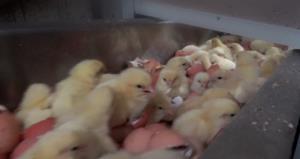
 Didier Guillaume, the Minister of Agriculture for France, has joined his counterpart, Julia Klockner of Germany in introducing a ban on post-hatch destruction of cockerels. Disposal will be illegal effective 2021 together with other welfare reforms including requiring anesthesia to castrate piglets. Whether the ban will actually be implemented is a speculation given the absence of a practical system to differentiate embryo gender on a commercial scale. Expect a moratorium or protests that take the form of clogging Paris traffic with tractors or dumping of manure by aggrieved Brittany farmers outside their local Hotels de Ville
Didier Guillaume, the Minister of Agriculture for France, has joined his counterpart, Julia Klockner of Germany in introducing a ban on post-hatch destruction of cockerels. Disposal will be illegal effective 2021 together with other welfare reforms including requiring anesthesia to castrate piglets. Whether the ban will actually be implemented is a speculation given the absence of a practical system to differentiate embryo gender on a commercial scale. Expect a moratorium or protests that take the form of clogging Paris traffic with tractors or dumping of manure by aggrieved Brittany farmers outside their local Hotels de Ville
It is evident that concern is directed against mass euthanasia of cockerels using maceration. Obviously, the introduction of carbon dioxide asphyxiation years ago would have improved the public acceptability of the practice.
 In 2019 a Federal judge in Germany rejected a demand for an outright ban on mass euthanasia since there was no practical alternative. The egg industry in the EU functions according to a 2009 Directive requiring “immediate death” for chicks within 72 hours of hatch.
In 2019 a Federal judge in Germany rejected a demand for an outright ban on mass euthanasia since there was no practical alternative. The egg industry in the EU functions according to a 2009 Directive requiring “immediate death” for chicks within 72 hours of hatch.
There are a number of research programs directed at determining the gender of embryos within days of initiating incubation. Welfare activist have suggested a maximum incubation period of 5 days that at present appears impractical. Technology has been developed to sample embryos later in the incubation period by abstracting fluids from the egg and analyzing for biomarkers including sex hormones. An arbitrary 14-day cutoff will not placate welfare activists opposed on principle to all forms of intensive livestock production. Even if the industry were to adopt a practical system based on gender separation at 10 to18 days of incubation, a new cycle of agitation and opposition will be initiated, demanding earlier detection based on “pain”.
Activist in Germany have also invoked “gender discrimination” involving killing of cockerels and the nation is understandably sensitive to any form of mass killing.
Predictably animal activist in France were disappointed with the decision by the Minister of Agriculture including the radical animal protection group L214, that stated that the proposal was “not ambitious and did not address the basic problem.” The essence of opposition lies in the definition of the word “problem” By this term, activists mean intensive production to produce food.